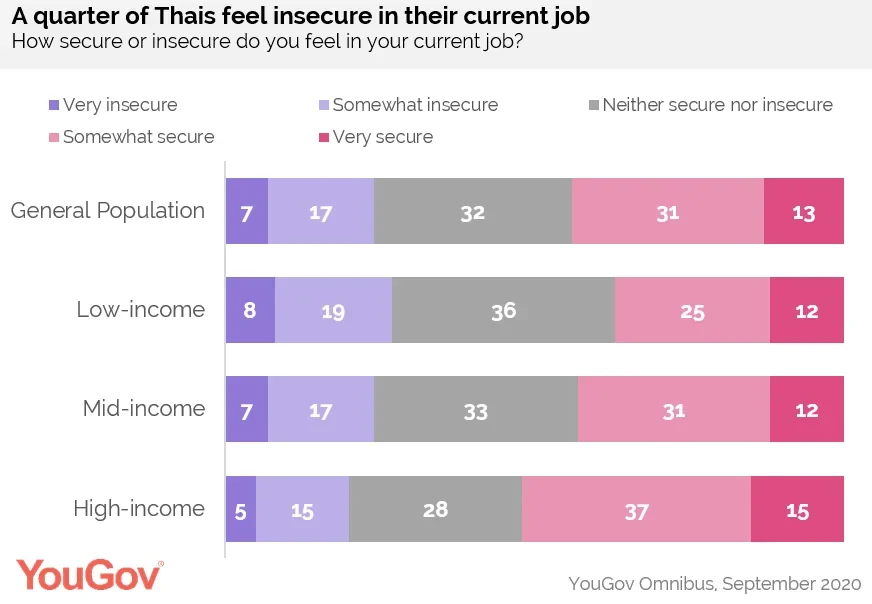
A quarter of Thais are experiencing job insecurity
Two thirds believe it will be hard to find another job in the face of unemployment
The pandemic has resulted in the world slipping into a global recession and mass unemployment – and Thailand is no exception. Research shows that the Thai unemployment is nearly at 10 percent due to COVID, and the nation is projected to suffer the worst economic downturn than any Southeast Asian state, due to its high dependence on global tourism. YouGov surveys full-time workers in the nation, to find out how they are coping with job insecurity, and their attitudes towards unemployment.
Job insecurity refers to the fear of losing one’s job. A quarter (24%) of Thai employees feel insecure in their jobs, up four percent compared to a pre-COVID era. Over one in twenty (7%) feel ‘very insecure’, almost two in ten (17%) feel ‘somewhat insecure’. A quarter (32%) feel neither secure nor insecure and two in five (44%) feel secure in their jobs. High-income earners (monthly household income of more than THB 45,000) are the most likely to feel secure in their jobs, whereas low-income earners (monthly household income of less than THB 15,000) are the least likely to say the same (52% vs. 37%). Men are also more likely to feel secure in their jobs than women (48% vs. 40%).

The majority (94%) of employed Thais are experiencing some level of stress over losing their jobs – only a small percentage (6%) feel ‘not at all stressed’. About ten in ten (18%) feel a little stressed, half (49%) feel somewhat stressed, and over a quarter (27%) feel very stressed. Unsurprisingly, those who are feeling ‘very insecure’ in their jobs are the most likely to feel very stressed – with almost two-thirds (65%) saying so, as opposed to those who feel ‘very secure’ (21%).
In the event of losing their jobs tomorrow, two-thirds (67%) believe it will be difficult to find another one of similar pay and benefits – almost two in five (38%) think it’ll be ‘somewhat difficult’ and three in ten (29%) think it’ll be ‘very difficult’. Two in ten (22%) are indifferent, and the remaining one in ten (9%) would find it easy. Mid-income earners (monthly household income between THB 15,001 and THB 44,999) are the most likely to find it difficult to find another job, and high-income earners are the least likely (68% vs. 66%). A third (33%) believe they will be able to find a new job within three months should they find themselves unemployed tomorrow. Two in ten (20%) think this will be between three to six months, and the other two in ten (19%) think this will take between six months and a year. One in six (17%) think it will take longer than a year to find another job, and the remaining one in ten (11%) are unsure.
In the same circumstance of losing their jobs, over two in five (45%) of Thais are willing to take a pay cut of up to 20% to find a job in a similar position. Two in ten (22%) are willing to take a pay cut between 21 to 40%, and one in ten (10%) are willing to take a pay cut of more than 40%. A quarter (23%) are unwilling to take a pay cut at all. Those aged 25 to 34 are the least willing to take a pay cut, and those aged 18 to 24 are the most willing (28% vs. 16%). Women are also more likely to take a pay cut than men (26% vs. 19%).
***Results based on 1,479 Thais employed in full-time jobs surveyed on YouGov Omnibus